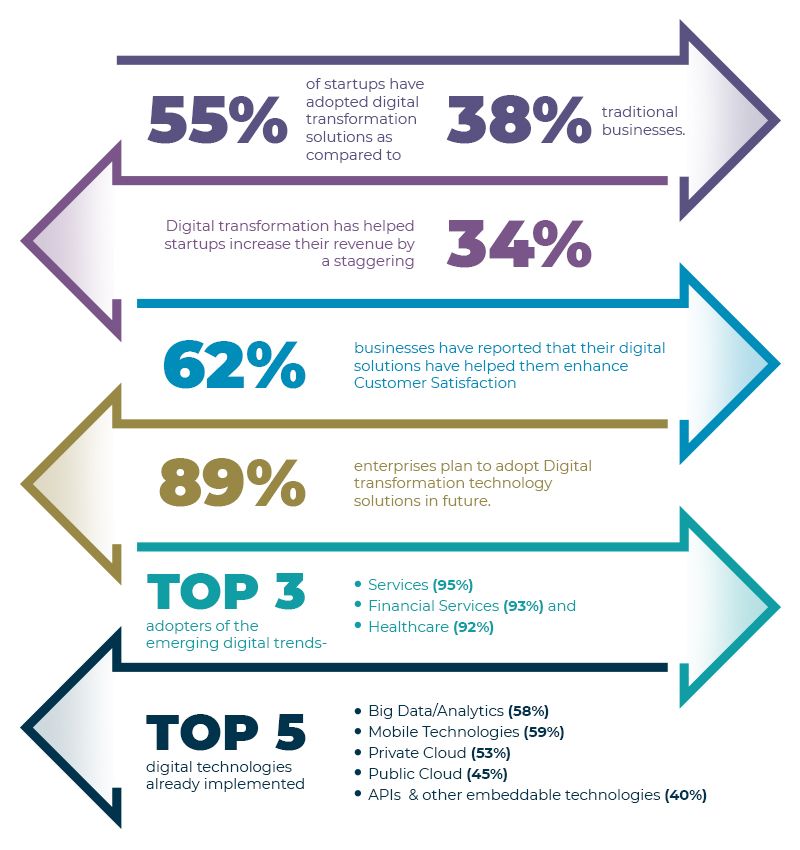
With benefits like cost reduction, revenue gains, improved customer engagement and experience, cross functional efficiency- digital transformation trends have revolutionized the current industry trends.
Any organization that wants to be successful should be ready to adapt to the current trends or face an uncertain future. For a business to maintain its continuity, it is important to build a solid technology plinth. Companies who have failed to anticipate the effect of emerging technologies have gradually become obsolete.
Need solutions that align technology, data and people?
Connect today with our software development experts!
So what is Digital Transformation and why it is the need of the hour for Industries and Businesses?
Digital Transformation can be defined as the, “acceleration of business activities, processes, competencies and models to fully leverage the changes and opportunities of digital technologies and their impact in a strategic and prioritized way.” In other words digital transformation is business transformation.
However, digital transformation is not just technological innovation and its impact on a business, but it is how an industry or business has adopted and used these technology innovations.
Digital transformation is an organizational shift that takes into account numerous possibilities, it is an intersection of technology, business and how it has an impact on the end user i.e. People.
In this digital era of smart phones and smart watches, the constant need to stay connected makes customers demand for a mix of technological capabilities with ease of use. Customer Demands and their expectations for ease of use have pushed technology to meet such business needs.
Top 3 Reasons why Businesses should undergo Digital Transformation if they want to grow
1) On-demand expectation:
Both internal customer and external customer expect top notch technology experience, which could pose few challenges for businesses. It’s a tough call for businesses to choose who to partner with for service delivery, how and where to deliver applications.
There is an exponential increase in demand for agile hybrid IT services and networking capabilities but the key ingredient for success here is nailing the user experience. And this has more to do with the actual working with IT teams and tools and not just the usability of applications.
Also the most crucial differential aspect is the ability to maintain the discipline around security and performance.
2) Enhance Effectiveness within employees
Digital technology plays a very crucial role in helping employers pave way for productive improvements. Digital Technology has a pivotal function in enhancing core business functional areas, from HR to finance it has automated processes with best results.
Remote working, having an access to technology on demand is no more things of the past; with such benefits employers are creating an environment that in turn makes management easier for them.
The only downside with expectation of on-demand services is the pressure it puts around the IT department within a business.
3) Security is a priority
Keeping the data secure is essential and crucial for any business; this is a challenge when there is a constant demand to put more and more data on the network. It becomes more complicated and requires rigorous enforcement around access, data compliance and security.
It is the need of the hour for progressive businesses to implement a proper security strategy across all networks, applications and data for services and service providers.
How can Businesses Digitally Transform Themselves and step up their game?
One way to do this is by Enabling Technologies as it can revitalize the production system by developing new technology solutions and improvements by conducting research. However, there are high investment costs, and intensive R&D associated with it.
Digital Transformation in Businesses can increase their value in the production chain, drive innovative processes and unify customers with their unique products.
Cloud-based applications: When the volume of any business increases certain manual processes just stop working and sometimes the existing systems are not only unable to support growth but also prevent it.
In these scenarios cloud applications offer the solutions that are always-on as long as there’s an internet connection.
High-speed integration capabilities: Most businesses are still using two different enterprise applications with different requirements either-cloud, mobile or on-premise systems. This results in incommodious reporting processes that could result in critical data either being lost or simply being unavailable.
Cloud-based enterprise integration platforms are able to connect the existing ERP and CRM systems with a range of 3rd party APIs. Such integrations help real-time decisions by aligning data across systems.
Infrastructure as a Service (IaaS): IaaS allows businesses to access resources and services with a new server, this allows developers to create virtual machines (VMs) and deploy databases for workloads and backups.
IaaS empowers businesses by shifting their functionality from business administrator to business analysts.
Today on an average businesses are digitized up to 40% which brings us to conclude that digital transformation is very much real and is definitely turning processes around.
Currently the trend is more evident in emerging growth companies as they can build from scratch and are in the best place to leverage it. This in turn puts the old established business at risk as they face the risk of lagging behind while struggling with old technology, processes and people.
It’s a precarious situation – whether to invest in new services now or to wait until a crisis. To succeed businesses have to decide and act now towards a complete overhaul of technology – towards an exponential change.






thanks for the posts very useful blogs